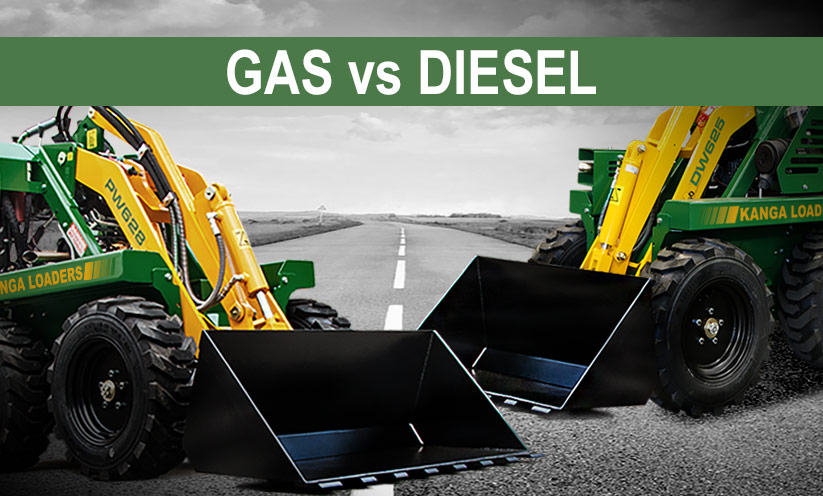
Not sure which loader is the right one for you? We often get asked, what is better – a gas or diesel loader?
Whether you choose gas or diesel, really depends on your individual application. Generally, before buying your compact loader and deciding which engine is the right choice, you should really take some time to ask yourself the following questions:
You may want to stick with the fuel that’s most readily available – or common to your fleet. If you currently operate all gas-powered or diesel-powered equipment, you may prefer to expand your fleet with the same-fuel machine. Also, consider the availability of diesel in your area, and your degree of familiarity using the fuel.
Diesel engines function on compression ignition (as opposed to spark ignition), which creates less stress on components. As a result, they tend to last longer than spark-ignition engines under equivalent duty. This factor helps justify the higher up-front cost of diesel loaders. Diesel engines are known for their durability and reliability.
Diesel is less volatile than gasoline, and thus needs higher compression and special heating elements in the combustion chamber to make cold starts possible. Once it’s up and running though, a diesel engine is extremely economical and will use around 30 per cent less fuel than a comparable gasoline unit.
Consider the availability of gas or diesel mechanics who can service your equipment.
Operating a diesel machine in cold weather requires certain precautions. For example using the correct diesel fuel type, and preheating the system to ensure the engine starts properly. In addition, you must maintain a 50/50 water/anti-freeze ratio in the radiator to prevent the engine block from cracking.
The entire range of Kanga models can make inexperienced users comfortable and productive. And that in a matter of minutes with attention given to the ergonomics of the soft-touch control system. The system ensures the operators’ hands remain on the reference bars at all times.
Both gas and diesel loaders can be serviced easily. Diesel engines tend to have extended service intervals versus gasoline.
Diesel powered loaders, as a rule, would hold a better re-sale value than a gas loader, and is something to be considered upon purchase.
To provide you with the ‘best fit’ equipment that will make you more productive and profitable, Kanga offers a variety of models in compact loaders. Ultimately, the choice depends on your needs as the operator. Our sales representative can assist you in determining which Kanga suits you best. Which model, tracked or wheeled, diesel or gas powered, will deliver the best performance, and allow you to make an informed decision.
Want to see our range of compact utility loaders? Then click here.
Got questions? Phone us on 833 30 KANGA (833 305 2642), or send us a message on our Facebook Page @KangaLoaders!
1 reply on “Gas or Diesel Loader – Which is the right one for you?”
[…] Generally, the frequency of use will determine your power options. Gas compact loaders attract the lowest upfront cost, however for those putting big hours on the machine find that the diesel is the cheapest option in the long run. Our sales reps have a handy guide that helps you determine which mini skid steer loader is best for the hours you plan to put on the mini loader. A more detailed comparison of the two engine types can be found here. […]